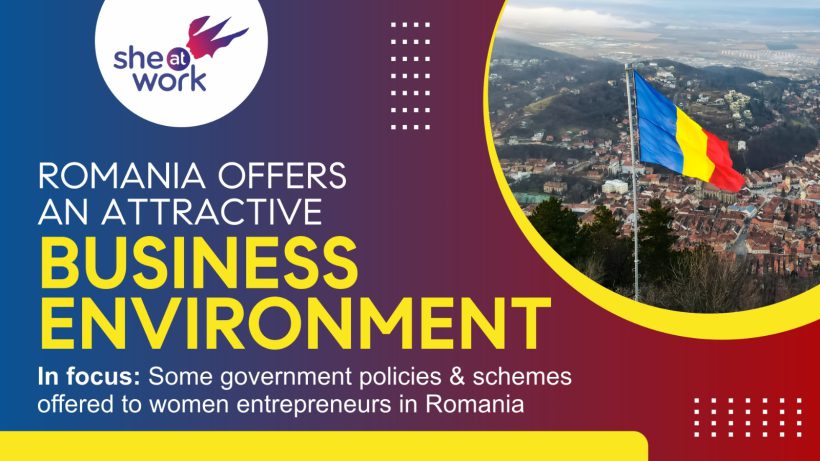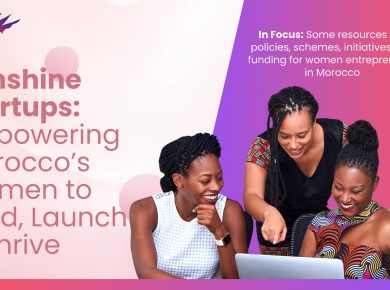In focus: Some government policies & schemes offered to women entrepreneurs in Romania
Romania is a country backed by well-preserved history. What make it a fantastic travel destination are – the culture, iconic landmarks and beautiful landscapes.
Did you know that the Romanian economy is one of the world’s fastest developing markets? As the largest country in south-eastern Europe, Romania is set apart by a rising GDP (gross domestic product), high-growth, and rapid investment. Plus, Romania is a market with strategic location, vast potential and well-educated workforce, offers numerous possibilities for foreign investors who are thinking about entering the European market or expanding their business in the region.
The attractiveness of Romania’s business environment is reflected in its positive rankings in international business surveys.
Here are some government policies and schemes offered to women entrepreneurs in Rumania:
> IFC and Garanti Leasing Support Women Entrepreneurs in Romania
IFC, member of the World Bank Group, has provided an EUR 5 million loan to Garanti Leasing, part of Garanti Romania – one of the most dynamic financial groups on the local market, for financing small and medium enterprises (SMEs) owned or managed by women. As a result of the agreement, Garanti Leasing is the first leasing company in Romania, directly financing women-owned or woman-managed SMEs. The company is continuing Garanti Bank’s strategy – of supporting women entrepreneurs.
This is the third agreement signed by IFC with Garanti Group Romania targeting women entrepreneurs and improving their access to finance. IFC previously provided long term loans to Garanti Bank in 2011 (EUR 22.5 million) and 2014 (EUR 35 million) for funding businesses in Romania owned or managed by women.
https://www.syminvest.com/news/ifc-and-garanti-leasing-support-women-entrepreneurs-
in-romania/2017/5/24/6632
https://documents1.worldbank.org/curated/en/959051594636902735/pdf/Taking-
Women-Entrepreneurs-to-the-Bank-in-Romania.pdf
> Government support – Horizon 2020, Startmeup Romania, Vitas Romania, National Agency for SMEs and Co-operatives (DAPIMM), SRL-D programme
In 2014, the Romanian government published its National Strategy for SMEs andBusiness Environment (Horizon 2020), which outlined its seven-year programme to create a favourable environment for business, private initiatives and entrepreneurship, stimulating the creation and development of small and medium enterprises (SMEs) and support – to increase the competitiveness of the local business environment but also the development of existing businesses and creating new jobs by the end of 2020.
A key part of governmental support for start-ups comes in the form of the National Agency for SMEs and Co-operatives (DAPIMM) and its SRL-D programme. SRL-D targets those people with no previous business ownership experience.
DAPIMM also has a non-financial services programme (called EMPRETEC) – to promote an entrepreneurial culture and skill base among its beneficiaries. EMPRETEC is a 10-day training curriculum (designed at Harvard) and certification program.
Startmeup Romania
Startmeup Romania is a new not-for-profit support organization (launched in late 2016), funded by donations from corporate CSR initiatives. It currently develops education curricula for young students, but also plans on providing business development support services in future. It also plans to engage in research-based policy work, as a way of engaging with the debate around reducing barriers for new entrants the marketplace.
Whilst most starts-ups are in the IT and tech sectors, Startmeup sees its role in supporting more service-based businesses.
Vitas Romania
Vitas Romania (established in 1996 as CHF Romania) provides traditional microfinance
services, offering the services to “unbankable” entrepreneurs. As part of searching for niche markets, it is planning to deliberately target the start-up market in future (a segment where banks are not active).
> Romanian Strategy for the Development of Small and Medium Enterprises (RGSDSMEBE)
Policy priorities on SME and entrepreneurship policy are outlined in the Romanian
Strategy for the Development of Small and Medium Enterprises (RGSDSMEBE).
Women are supported in acquiring entrepreneurship skills through both general
programmes that are open to everyone, as well as through initiatives that are tailored for
women.
The general programmes include:
Start-up Nation 2020; Micro-industrialization national multi-annual programme 2020; Programme for the development and modernization of the marketing activities of the market products and services; National Programme for Trades and Handicrafts Support 2020; and Support for the development of small farms.
In general, these programmes are all multi-year programmes that support the development of SMEs through integrated packages of support – addressing both skills development and offering finance. These are complemented by several internationally- supported initiatives such as the UNCTAD / EMPRETEC Romania programme to support the development of small and medium enterprises 2020 and The Romanian- Swiss SMEs Programme. Women typically have favoured access to these supports, since the in-take mechanisms tend to award more points to applications from women entrepreneurs.
https://www.oecd.org/cfe/smes/Romania-IE-2020.pdf
> The Center for Women’s Economic Empowerment (CWEE)
The Center for Women’s Economic Empowerment (CWEE) advances gender equality in emerging markets, to build more inclusive, thriving economies and democracies that deliver to all citizens. Founded within the Center for International Private Enterprise (CIPE), CWEE consolidates nearly four decades of experience to promote women’s leadership and improve their economic conditions through private sector engagement, advocacy, and partnerships with governments and civil society. CWEE supports CIPE’s network of partners in more than 80 countries.
https://www.cipe.org/cwee/#:~:text=The%20Center%20for%20Women’s%20Economic,t
hat%20deliver%20for%20all%20citizens.
> EmpowerHER
EmpowerHER, a joint initiative of the U.S. Commercial Service Europe and AmCham EU is involved in promoting gender equality and women’s empowerment by:
- Advancing women’s economic empowerment and gender equality in international
trade - Urging U.S. and European companies to diversify their workplace and support women-owned businesses
- Improving tools and services for women
- Increasing awareness for female entrepreneurs of trade, investment, and export- related services.
AmCham is among the first signatories of the Declaration in Romania, and partners with the U.S. Embassy in Romania, in inviting companies to enroll in this initiative and implement the EmpowerHER agenda in companies doing business in Romania.
> IFN ROMCOM SA
IFN ROMCOM SA is a small size non-bank financial institution incorporated in 2006, as
a microcredit provider. It is headquartered in Oradea (northwest Romania) and is active
mainly in northwest and western regions.
It provides long and short-term loans for investment and working capital to start-ups and
the SME sector, as well as non-financial services (in the form of training). Its aim is to
support economic growth, and as part of this nearly a quarter of its portfolio is invested
in start-ups.
https://www.european-microfinance.org/sites/default/files/2019-03/ROMCOM%20Presentation.pdf
> good.bee Credit
good.bee Credit was launched in 2008 and is active in microfinance and small enterprises. It typically reaches “unbankable” clients, and aims to “graduate” them to traditional banks in future. Many of their clients are so called “unbankable” because their level of income is too low; others because some or all of their income is earned in the informal sector (which isn’t taken into consideration by banks).
As its targeting is based on economic sector, good.bee Credit’s experience to date with start-ups is modest. In future, good.bee Credit plans to diversify its portfolio towards a more urban market, which could potentially include start-ups as well.










